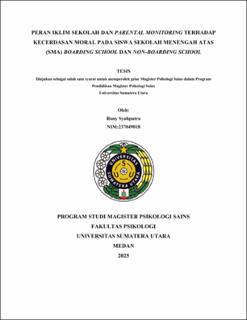| dc.description.abstract | Moral intelligence refers to an individual's ability to distinguish between right and wrong and to act in accordance with ethical values. This study aims to examine the roles of school climate and parental monitoring in influencing students’ moral intelligence, as well as to identify differences in moral intelligence between students in boarding schools and non-boarding schools. A total of 357 students from Al-Azhar Senior High School Medan participated in this study, selected using a convenience sampling technique. Data were collected using the Moral Intelligence Scale, the School Climate Scale, and the Parental Monitoring Scale, all of which had been tested for validity and reliability. Data analysis was conducted using multiple linear regression and analysis of covariance (ANCOVA), along with statistical assumption tests including normality, linearity, heteroscedasticity, multicollinearity, and homogeneity. The results showed that both school climate and parental monitoring had a positive and significant influence on students’ moral intelligence. However, parental monitoring contributed more substantially, with a partial eta squared value of 0.431, compared to school climate which had a value of 0.063. These findings indicate that parental monitoring plays a more dominant role in shaping students' moral intelligence compared to the influence of school climate. In addition, the results of the study also indicate that moral intelligence is not dependent on the school system, whether boarding school or non-boarding school, as the contribution of school type differences to the variation in moral intelligence is only 0.1% (partial eta squared value = 0.001). | en_US |


